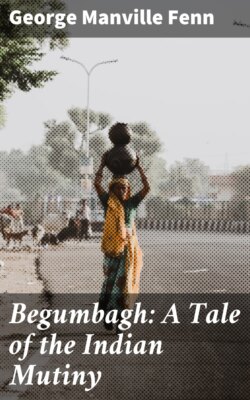Читать книгу Begumbagh: A Tale of the Indian Mutiny - George Manville Fenn - Страница 6
На сайте Литреса книга снята с продажи.
Begumbagh, a Tale of the Indian Mutiny.
ОглавлениеDun-dub-dub-dub-dub-dub. Just one light beat given by the boys in front—the light sharp tap upon their drums, to give the time for the march; and in heavy order there we were, her Majesty’s 156th Regiment of Light Infantry, making our way over the dusty roads with the hot morning sun beating down upon our heads. We were marching very loosely, though, for the men were tired, and we were longing for the halt to be called, so that we might rest during the heat of the day, and then go on again. Tents, baggage-wagons, women, children, elephants, all were there; and we were getting over the ground at the rate of about fifteen miles a day, on our way up to the station, where we were to relieve a regiment going home.
I don’t know what we should have done if it hadn’t been for Harry Lant, the weather being very trying, almost as trying as our hot red coats and heavy knapsacks, and flower-pot busbies, with a round white ball like a child’s plaything on the top; but no matter how tired he was, Harry Lant had always something to say or do, and even if the colonel was close by, he’d say or do it. Now, there happened to be an elephant walking along by our side, with the captain of our company, one of the lieutenants, and a couple of women in the howdah; while a black nigger fellow, in clean white calico clothes, and not much of ’em, and a muslin turban, and a good deal of it, was striddling on the creature’s neck, rolling his eyes about, and flourishing an iron toasting-fork sort of thing, with which he drove the great flap-eared patient beast. The men were beginning to grumble gently, and shifting their guns from side to side, and sneezing, and coughing, and choking in the kicked-up dust, like a flock of sheep, when Captain Dyer scrambles down off the elephant, and takes his place alongside us, crying out cheerily: “Only another mile, my lads, and then breakfast.”
We gave him a cheer, and another half-mile was got over, when once more the boys began to flag terribly, and even Harry Lant was silent, which, seeing what Harry Lant was, means a wonderful deal more respecting the weather than any number of degrees on a thermometer, I can tell you; but I looked round at him, and he knew what it meant, and, slipping out, he goes up to the elephant. “Carry your trunk, sir,” he says; and taking gently hold of the great beast’s soft nose, he laid it upon his shoulder, and marched on like that, with the men roaring with laughter.
“Pulla-wulla. Ma-pa-na,” shouted the nigger who was driving, or something that sounded like it, for of all the rum lingoes ever spoke, theirs is about the rummest, and always put me in mind of the fal-lal-la or tol-de-rol chorus of a song.
“All right. I’ll take care!” sings out Harry; and on he marched, with the great soft-footed beast lifting its round pads and putting them down gently so as not to hurt Harry; and, trifling as that act was, it meant a great deal, as you’ll see if you read on, while just then it got our poor fellows over the last half-mile without one falling out; and then the halt was called; men wheeled into line; we were dismissed; and soon after we were lounging about, under such shade as we could manage to get in the thin tope of trees.
